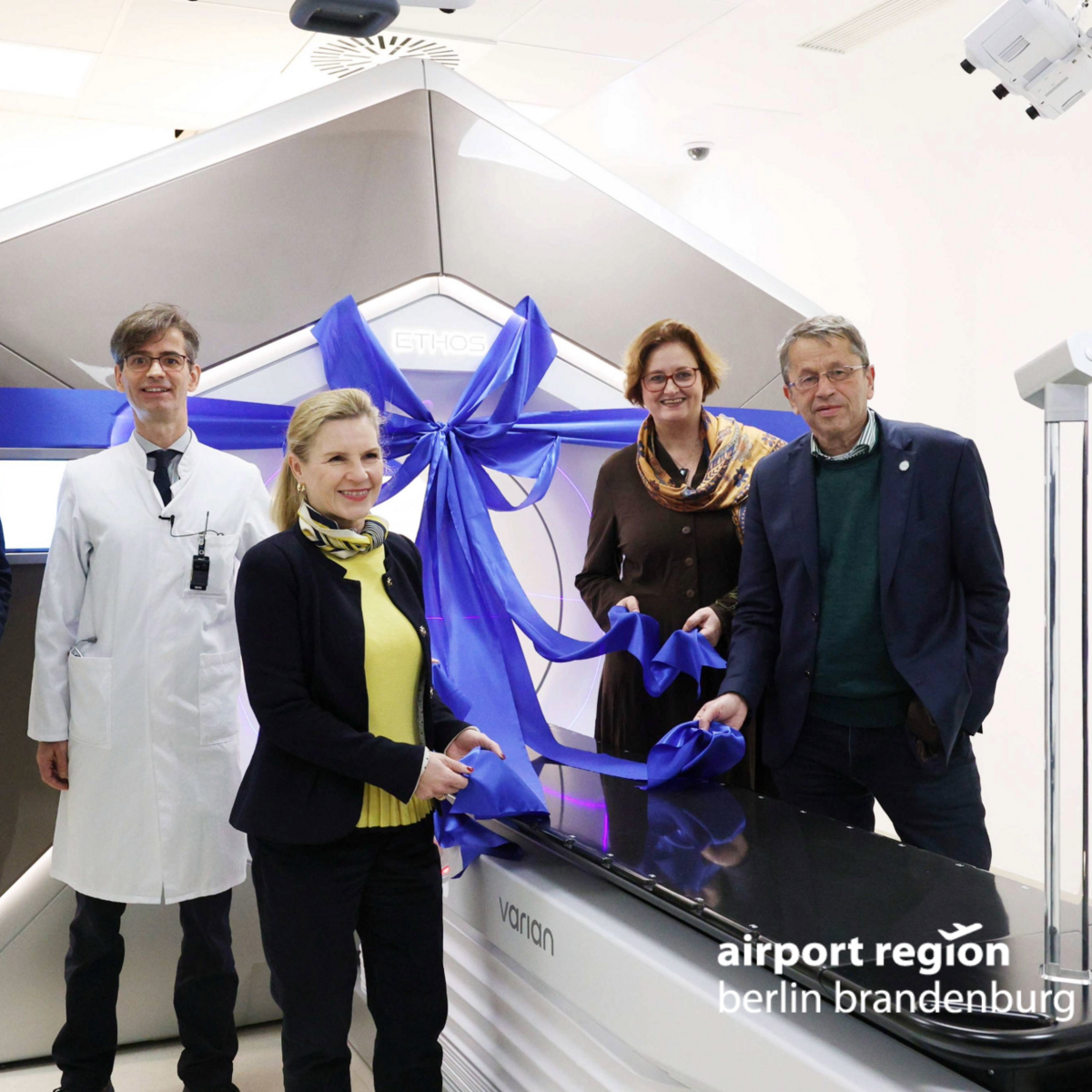Adaptive radiotherapy: precise radiation for even more effective tumour treatment
Radiotherapy is one of the cornerstones of cancer treatment: around half of all cancer patients receive this therapy at some point during the course of their disease. To make radiotherapy even more precise and gentle in the future, Charité - Universitätsmedizin Berlin offers the unique option of adaptive radiotherapy with a new high-tech device. The linear accelerator was officially inaugurated by the end of January by the Senator for Science, Health and Care, Dr Ina Czyborra, the Chairman of the Board of Directors of the Charité, Prof. Heyo K. Kroemer, and Prof. Daniel Zips, Director of the Department of Radiation Oncology and Radiotherapy.
During radiotherapy, the tumour is exposed to ionising radiation. This high-intensity radiation can change molecules in the body and is usually produced using linear accelerators. The radiation is designed to damage the cells in the tumour tissue, particularly the cell nucleus, which contains the genetic information. The aim is to destroy or at least shrink the tumour through radiation, while allowing healthy tissue to regenerate quickly.
However, with conventional radiotherapy, there is a risk that surrounding tissue may be affected - especially if the tumour is growing or shrinking rapidly - or if organs change position, for example during bowel or stomach movements. This is because the images taken in previous days may no longer be completely accurate.
Adaptive radiotherapy aims to minimise side effects
This is not the case with the new "Ethos" radiotherapy system, as Professor Daniel Zips, Director of the Department of Radiation Oncology and Radiotherapy, explains: "The radiation can be adapted to actual changes in the position and size of organs and tumours. Within a few minutes, the machine determines the exact geometric relationships between the tumour and the surrounding organs using its integrated computed tomography". The optimal distribution of the radiation dose is then determined. This allows for more precise and less invasive radiotherapy.
"Adaptive therapy combines maximum efficacy with minimum side effects," said Prof. Heyo K. Kroemer, Chairman of the Board of the Charité. "I am delighted that we are able to offer our patients this groundbreaking radiotherapy method. It is a decisive step towards personalised precision radiotherapy at the Charité".
"Research and patient care will benefit equally from the introduction of adaptive radiotherapy at the Charité," said Dr Ina Cyzborra, Senator for Science, Health and Care. "We are once again demonstrating the innovative power of Berlin as a centre for health and science."
Artificial intelligence (AI) for maximum accuracy
A key component of the new radiotherapy method is the integration of artificial intelligence (AI). This creates a model and generates a highly accurate, daily updated radiotherapy plan. During treatment, the AI technology continuously adapts to changes, resulting in even more precise radiotherapy.
Patients with gynaecological tumours, prostate or bladder cancer - organs where bladder and bowel fillings influence the localisation - can particularly benefit from this. "At the Charité, we will initially use adaptive radiotherapy for patients with prostate cancer," says Prof. Zips. Later, it will be extended to other tumour types.
Combining high-tech, AI and human expertise
"Despite the state-of-the-art technology, human expertise is also indispensable for this procedure," says Prof. Zips. Experts carefully review the proposed radiotherapy plan and decide whether to approve it. The precise adaptation of the radiotherapy to the current conditions and continuous monitoring by specialists guarantee optimal treatment.
As part of the research cooperation between the equipment manufacturer Varian Medical Systems and the Charité, patients are accompanied by a team of professionals and can actively contribute to the adaptation of the therapy through their feedback. In addition, studies are being conducted to determine which prostate cancer patients benefit most from adaptive therapy.
Medicine of the future
The close collaboration between leading global players, renowned scientists, first-class clinics and an innovative start-up community makes the capital region one of the world's leading healthcare and life sciences locations.
Interdisciplinary networks, specialised experts, technology transfer and disruptive technologies are key factors in turning scientific discoveries into innovative products for the global healthcare market.
For further information on the economic development of the growth sectors and on business and technology support for companies, investors and scientific institutions, please contact
Melanie Gartzke I melanie.gartzke(at)airport-region.de
Source: Press release "Adaptive radiotherapy: precise radiation for even more effective tumour treatment", 24 January 2024

![[Translate to English:] [Translate to English:]](/fileadmin/_processed_/0/d/csm_2024_02_02_Charite_CFM_BPK_Photo_Michael_Kleber_6184_1_4677263f23.jpg)